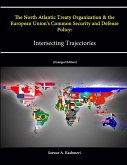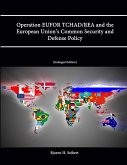Until the end of the Cold War, NATO was the dominant organization for collective security in Europe. Throughout that time it had always been a particular American interest to increase the European contribution to security on the European continent in order to share burdens equally. After the end of the Cold War the strategic situation in Europe changed dramatically. The dominant threat of the Soviet Union was replaced by a much more diffuse and less obvious situation of potential instabilities on the periphery of Europe, including rising terrorist activities and the proliferation of nuclear technology. This called for not only re-evaluating the role and purpose of existing organizations for collective security, but also developing other organizations which could contribute to more stability in a globalized world. Triggered by the developments in the Balkans in the early 1990s an intense discussion in Europe took place about required adaptations. The crisis made it perfectly clear for European nations that while economically important, Europe possessed neither the required institutions nor the military capabilities to conduct effective crisis management on the peripheries of Europe. European countries were conscious that their individual national capabilities were very limited and that the development of a security component within the European integration had been neglected for a long time. The trigger of the crisis in Yugoslavia led to the Petersberg declaration (1992), the Amsterdam treaty (1997) and the landmark decisions of the European Council of Cologne and Helsinki (1999), which in turn led to the formulation of the European Headline Goal and subsequently a series of initiatives and programs that aimed to improve European Union (EU) military capabilities in the field of crisis response. Many critics see these activities as a duplication of efforts. In their view NATO should serve as the platform to focus European efforts and to enhance military capabilities.
Hinweis: Dieser Artikel kann nur an eine deutsche Lieferadresse ausgeliefert werden.
Hinweis: Dieser Artikel kann nur an eine deutsche Lieferadresse ausgeliefert werden.








